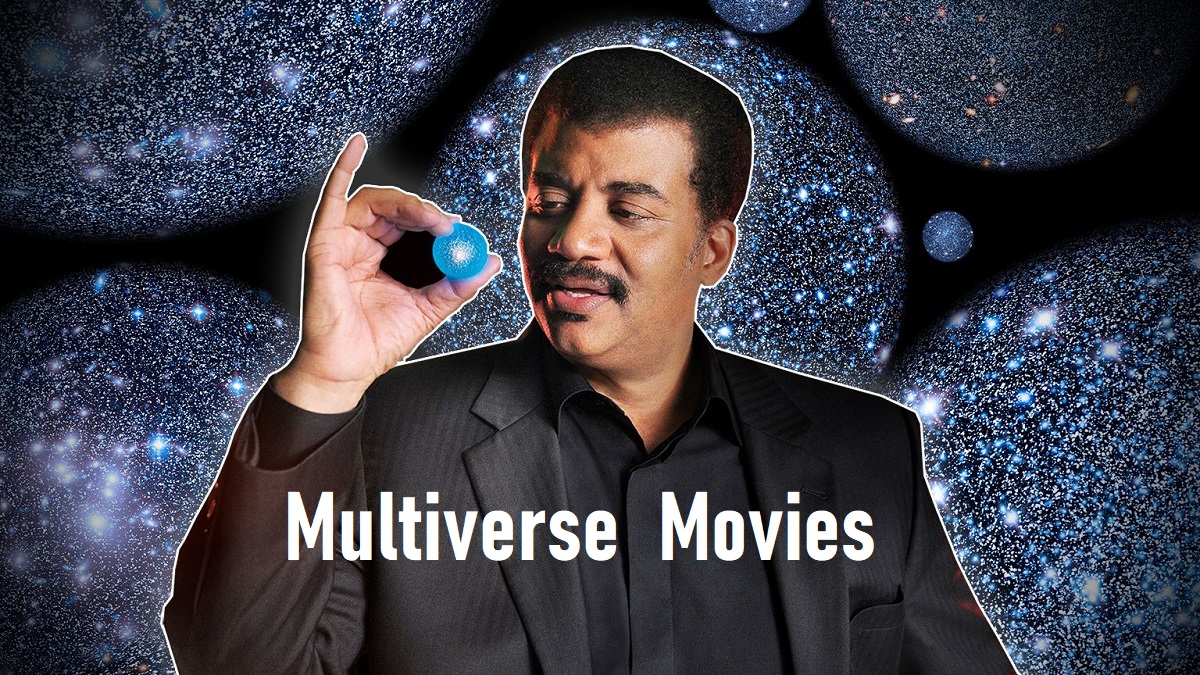In the realm of cinema, the concept of the multiverse has captivated audiences for decades. It’s a concept that allows filmmakers to explore endless possibilities, creating alternate realities and parallel dimensions where anything can happen. From superheroes battling their evil counterparts to individuals navigating the complexities of multiple dimensions, the multiverse has become a rich source of storytelling in film.
In this article, we’ll take a deep dive into the world of multiverse movies, counting down the top 10 films that have successfully delved into the intricacies of parallel realities. We’ll evaluate each film based on its quality and its exploration of the multiverse concept. So, buckle up as we journey through the multiverse of cinema!
The Top 10 Multiverse Movies
1. “Everything Everywhere All at Once”
- Director: Dan Kwan and Daniel Scheinert
- Starring: Michelle Yeoh
“Everything Everywhere All at Once” takes the top spot on our list for its mind-bending exploration of the multiverse. This sci-fi comedy is a genre-blender, seamlessly combining action, family drama, and surreal humor. The story revolves around laundromat owner Evelyn Wong, played brilliantly by Michelle Yeoh, who embarks on a quest to rescue reality by absorbing the skills of her alternate selves.
| Pros | Cons |
|---|---|
| Mind-bending storytelling | Complex narrative |
| Outstanding performance | May be confusing for some |
| Unique blend of genres |
The film pushes the concept of the multiverse to its limits, offering a rollercoaster of emotions that will make you laugh, cry, and contemplate the nature of existence. It’s a testament to the creative possibilities of parallel realities in cinema.
2. “Spider-Man: Into the Spider-Verse”
- Directors: Peter Ramsey, Rodney Rothman, and Bob Persichetti
- Voice Cast: Shameik Moore, Jake Johnson, Hailee Steinfeld
“Spider-Man: Into the Spider-Verse” swings into our list as one of the best multiverse movies ever made. This animated masterpiece introduces us to Miles Morales, who takes up the mantle of Spider-Man in his dimension. However, he soon finds himself teaming up with Spider-People from parallel worlds.
| Pros | Cons |
|---|---|
| Stunning animation | None |
| Diverse and endearing characters | Engaging storyline |
| Fresh take on Spider-Man |
The film’s animation is a visual feast, offering a unique stylistic representation of the multiverse. Miles Morales’ journey as he navigates different dimensions is both heartwarming and action-packed. “Into the Spider-Verse” proves that the Spider-Man franchise can thrive in the multiverse.
3. “Spider-Man: No Way Home”
- Director: Jon Watts
- Starring: Tom Holland, Zendaya, Tobey Maguire, Andrew Garfield
When it comes to the multiverse, “Spider-Man: No Way Home” delivers a spectacular crossover event that fans had only dreamed of. Tom Holland’s Peter Parker inadvertently breaks the multiverse, bringing villains and heroes from other Spider-Man films into his world.
| Pros | Cons |
|---|---|
| Nostalgia-inducing crossover | Some plot conveniences |
| Strong chemistry among cast | |
| Emotional depth |
The film’s emotional depth, combined with the sheer excitement of seeing Tobey Maguire and Andrew Garfield return as Spider-Man, makes it a memorable addition to the multiverse subgenre. It explores the consequences of meddling with parallel realities and the bonds that tie different versions of heroes together.
4. “Source Code”
- Director: Duncan Jones
- Starring: Jake Gyllenhaal, Michelle Monaghan
“Source Code” is a sci-fi thriller that delves deep into the concept of alternate timelines and realities. Jake Gyllenhaal plays Captain Colter Stevens, who believes he’s in a simulation of the past to identify a terrorist bomber. However, the truth is far more complex and involves the creation of new worlds.
| Pros | Cons |
|---|---|
| Intriguing premise | |
| Engaging human drama | |
| Clever storytelling |
Duncan Jones, known for his work on “Moon,” once again takes a sci-fi premise and infuses it with gripping human drama. “Source Code” challenges our understanding of reality and the consequences of manipulating time and parallel dimensions.
5. “Coherence”
- Director: James Ward Byrkit
- Starring: Emily Baldoni, Maury Sterling
“Coherence” is an underrated psychological thriller that explores the consequences of a passing comment on the fabric of reality. The film follows eight friends who experience strange occurrences during a dinner party, leading to the unraveling of parallel dimensions.
| Pros | Cons |
|---|---|
| Complex characters | Limited special effects |
| Philosophical exploration | Low budget |
| Thought-provoking |
While “Coherence” may lack grandiose special effects, it compensates with its thought-provoking narrative and complex characters. It’s a prime example of how low-budget films can excel in exploring the multiverse concept.
Honorable Mentions
Before we unveil our next pick, let’s take a moment to acknowledge some honorable mentions that didn’t quite make the top 10 but are still worth a watch:
1. “Turtles Forever”
- Directors: Roy Burdine and Lloyd Goldfine
- Voices: Michael Sinterniklaas, Wayne Grayson
In “Turtles Forever,” worlds collide as the 1987 and 2003 versions of the Teenage Mutant Ninja Turtles team up. This fun-filled crossover explores a multiverse of turtle-powered adventures.
2. “Sliding Doors”
- Director: Peter Howitt
- Starring: Gwyneth Paltrow, John Hannah
“Sliding Doors” is a romantic comedy that examines how chance events can drastically alter the course of our lives. It’s a thought-provoking exploration of the multiverse within the context of a relationship.
3. “John Dies at the End”
- Director: Don Coscarelli
- Starring: Chase Williamson, Rob Mayes
“John Dies at the End” takes audiences on a bizarre and mind-bending journey, where alternate realities and surreal occurrences blur the lines of reality. It’s a wild ride through the multiverse.
Now, let’s continue our countdown of the top 10 multiverse movies.
6. “Doctor Strange in the Multiverse of Madness”
- Director: Sam Raimi
- Starring: Benedict Cumberbatch, Elizabeth Olsen, Rachel McAdams
While the first “Doctor Strange” movie touched on the multiverse concept, it’s the sequel, “Doctor Strange in the Multiverse of Madness,” that fully embraces it. The film introduces America Chavez, who can open portals to different dimensions, and explores the quirkier aspects of the multiverse.
| Pros | Cons |
|---|---|
| Quirky multiverse exploration | |
| Strong horror elements | |
| Dark and engaging storyline |
Directed by Sam Raimi, known for his work on the “Spider-Man” trilogy, the sequel offers a mix of horror and supernatural elements that befit the overwhelming nature of the multiverse. It raises questions about the implications of multiple dimensions and the potential threats they pose.
7. “Justice League: Crisis on Two Earths”
- Directors: Sam Liu and Lauren Montgomery
- Voice Cast: William Baldwin, Mark Harmon, Chris Noth
In “Justice League: Crisis on Two Earths,” DC’s greatest heroes find themselves facing a unique challenge—battling their evil counterparts from an alternate reality. This direct-to-video animated film explores the existential questions surrounding the multiverse.
| Pros | Cons |
|---|---|
| Fascinating premise | Animation style may not appeal |
| Gripping storytelling | |
| Explorative of the multiverse |
The film’s premise of good heroes battling their villainous counterparts adds depth to the narrative, highlighting the ethical dilemmas posed by the existence of alternate realities. It’s a thought-provoking addition to the multiverse subgenre.
8. “Parallel”
- Director: Isaac Ezban
- Starring: Aml Ameen, Martin Wallström
“Parallel” presents a tantalizing scenario—what if you could travel to alternate universes and do anything you wanted without consequences in your own? This Canadian sci-fi thriller follows four friends who discover a mirror that leads to parallel worlds, leading to a spiraling series of events.
| Pros | Cons |
|---|---|
| Intriguing central idea | Cinematography and dialogue |
| Exploration of consequences | |
| Multiverse as a moral playground |
While “Parallel” may have its shortcomings in cinematography and dialogue, it offers a fascinating exploration of its central idea: the moral implications of exploiting the multiverse for personal gain.
9. “Happy Death Day 2U”
- Director: Christopher Landon
- Starring: Jessica Rothe, Israel Broussard
“How do you top a time loop?” asks “Happy Death Day 2U,” the sequel to the black comedy slasher “Happy Death Day.” This time, the film links the original premise to a larger multiverse, introducing subtle and not-so-subtle differences in parallel dimensions.
| Pros | Cons |
|---|---|
| Expands on the original premise | May not be as fresh as the first film |
| Thought-provoking themes | |
| Exploration of grief and identity |
While “Happy Death Day 2U” may not be as fresh as its predecessor, it offers an entertaining exploration of grief, identity, and the concept of parallel dimensions. It’s a fun addition to the multiverse subgenre.
10. “The One”
- Director: James Wong
- Starring: Jet Li, Delroy Lindo, Jason Statham
Kicking off our list is “The One,” a campy action affair that features Jet Li facing off against… himself. In this film, Jet Li plays Gabe Law, a Los Angeles cop who discovers that he’s being hunted down by an alternate version of himself from another universe.
| Pros | Cons |
|---|---|
| Campy action fun | Critics’ mixed reception |
| Jet Li’s talent | |
| Martial arts battles |
While “The One” may have faced criticism from critics, it still delivers campy action fun and showcases Jet Li’s martial arts talent. The film explores the idea that there are multiple parallel realities, each with its own version of ourselves.
Exploring the Multiverse in Cinema
The concept of the multiverse in cinema allows filmmakers to stretch the boundaries of storytelling. It opens up a world of endless possibilities where characters can encounter alternate versions of themselves, face moral dilemmas, and grapple with the consequences of their actions across parallel dimensions.
These multiverse movies not only entertain but also invite audiences to ponder profound questions about existence, identity, and the choices we make. Whether through mind-bending narratives or visually stunning animations, these films have left their mark on the world of cinema.
The Appeal of the Multiverse
What makes multiverse movies so appealing to audiences? It’s the allure of exploring the unknown, the excitement of encountering different versions of familiar characters, and the thrill of contemplating the vastness of the cosmos. The multiverse concept taps into our innate curiosity about what lies beyond our reality.
For example, “Spider-Man: Into the Spider-Verse” offers a fresh take on the iconic superhero by introducing multiple Spider-People from parallel dimensions. It’s not just about Spider-Man; it’s about the idea that anyone, anywhere, can don the mask and become a hero. This inclusivity resonates with viewers and adds depth to the Spider-Man mythos.
Real-Life Parallels
While the concept of parallel realities and alternate dimensions may seem far-fetched, there are real-life parallels in science that fuel our fascination with the multiverse. Theoretical physics, particularly the study of quantum mechanics and string theory, has postulated the existence of multiple universes.
For instance, the Many-Worlds Interpretation of quantum mechanics suggests that every possible outcome of a quantum event occurs in a separate branch of the universe. This notion aligns with the idea of infinite parallel realities, where every choice we make spawns a new universe.
Films like “Source Code” and “Coherence” draw inspiration from these scientific theories, blurring the lines between science fiction and reality. They challenge us to contemplate the implications of multiple dimensions on our own lives and decisions.
The Multiverse as a Moral Playground
One recurring theme in multiverse movies is the exploration of morality and the consequences of one’s actions. “Parallel” presents the multiverse as a moral playground, where individuals can exploit alternate realities for personal gain. This raises ethical questions about the limits of our desires and the impact of our choices on others.
Similarly, “Spider-Man: No Way Home” examines the responsibility that comes with tampering with the multiverse. Peter Parker’s decision to alter reality inadvertently brings villains into his world, forcing him to confront the ethical dilemmas of his actions.
These films serve as cautionary tales, reminding us that the choices we make in our own reality can have far-reaching consequences, not only for ourselves but for the entire multiverse.
The Multiverse’s Impact on Genre
The concept of the multiverse has transcended genre boundaries, influencing a wide range of films. From superhero blockbusters to intimate character-driven dramas, the multiverse has left its mark on cinema. Let’s explore how it has impacted different genres.
Superhero Spectacles
Superhero films have fully embraced the multiverse concept, allowing for epic crossovers and alternate versions of beloved characters. “Spider-Man: No Way Home” is a prime example of how the multiverse can elevate the superhero genre. It not only delivers thrilling action sequences but also explores the emotional connections between different Spider-People.
Similarly, “Doctor Strange in the Multiverse of Madness” combines the supernatural with the multiverse, delving into the darker aspects of parallel realities. The film introduces audiences to the bizarre and otherworldly dimensions that exist alongside the familiar Marvel Universe.
Horror and Suspense
The horror genre has also found fertile ground in the multiverse. “Doctor Strange in the Multiverse of Madness” incorporates strong horror elements, emphasizing the eerie and unsettling nature of alternate dimensions. This fusion of horror and the multiverse creates a unique cinematic experience.
In “Happy Death Day 2U,” the time loop premise is expanded into a multiverse concept. While the film retains its comedic and slasher elements, it introduces a layer of suspense by exploring the consequences of tampering with parallel realities.
Philosophical Thrillers
Films like “Source Code” and “Coherence” fall into the category of philosophical thrillers. These movies use the multiverse as a backdrop to explore deep existential questions. “Source Code” challenges our perception of reality and the consequences of our choices, while “Coherence” delves into the idea of branching realities and the impact of our decisions.
These philosophical thrillers engage the audience’s intellect, inviting them to contemplate the nature of existence and the interconnectedness of all possible realities.
The Multiverse in Pop Culture
Beyond the realm of cinema, the multiverse has become a pervasive concept in pop culture. It has found its way into television series, comic books, video games, and even academic discussions. Here are a few examples of how the multiverse has made its mark:
Television Series
Television series like “Rick and Morty” and “The Flash” have embraced the multiverse as a central theme. “Rick and Morty” explores infinite realities, each with its own bizarre twists and turns. The show’s humor often stems from the absurdity of parallel dimensions.
“The Flash” incorporates the multiverse into its storytelling, with different versions of the titular hero existing across various Earths. This allows for crossover events and alternate character interpretations, delighting fans of the DC Universe.
Comic Books
Comic books have long been pioneers in the exploration of parallel realities. The concept of the multiverse is a staple of superhero comics, with iconic storylines like “Crisis on Infinite Earths” reshaping entire universes.
Characters like the Marvel Comics’ “Exiles” and DC Comics’ “Multiversity” heroes traverse the multiverse, encountering alternate versions of well-known characters. These stories offer creative opportunities for writers and artists to reimagine classic heroes and villains.
Video Games
Video games have also dabbled in the multiverse concept. Games like “Bioshock Infinite” and “Chrono Cross” incorporate parallel dimensions into their narratives, challenging players to navigate complex, interconnected worlds.
In “Bioshock Infinite,” players explore the city of Columbia across different realities, each with its own unique twists. The game’s intricate storytelling and exploration of alternate dimensions add layers of depth to the gaming experience.
The Multiverse: A Boundless Canvas
In conclusion, the concept of the multiverse has become a boundless canvas for storytellers across various mediums, but particularly in cinema. It allows for the exploration of limitless possibilities, the contemplation of existential questions, and the examination of the consequences of our choices.
The top 10 multiverse movies we’ve discussed in this article offer a glimpse into the diverse ways filmmakers have harnessed the multiverse concept. Whether through animated adventures, superhero epics, or mind-bending thrillers, these films have left a lasting impact on the world of cinema.
As our understanding of the multiverse concept continues to evolve in both science and fiction, one thing remains certain: the allure of parallel realities and alternate dimensions will continue to captivate our imaginations and inspire new stories for generations to come. So, the next time you watch a multiverse movie, remember that you’re not just viewing a film; you’re embarking on a journey through the infinite possibilities of the multiverse.







